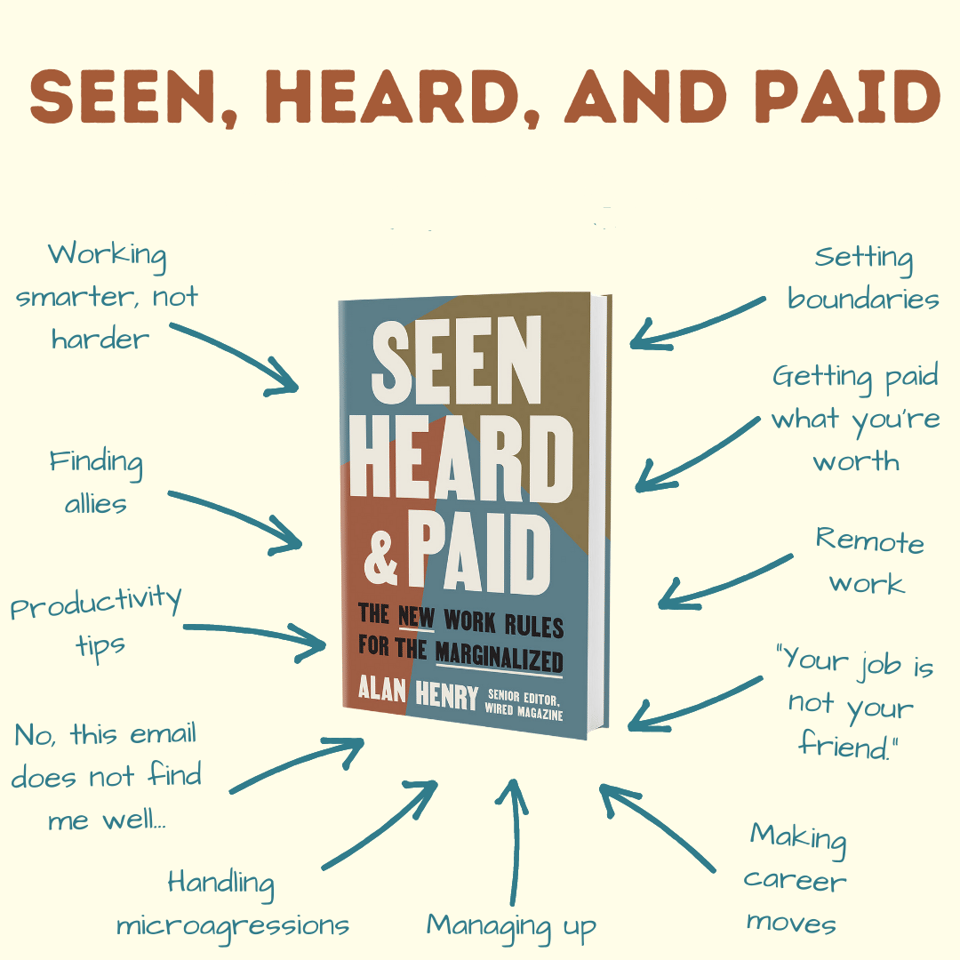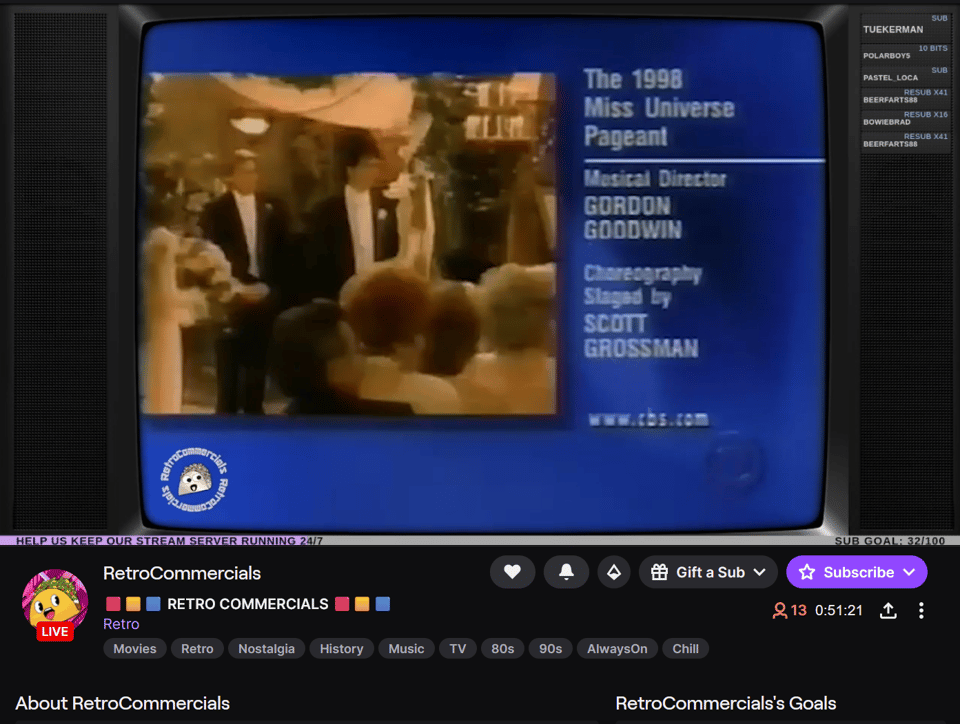1:1 Meetings, Why You Need Them, and How to Improve Them

No one likes meetings, but some are necessary—not just for your career but also to protect yourself.
Welcome back to Productivity, Without Privilege, where I either rant to you about the state of media writ large or offer you specific, actionable advice on how to survive as a marginalized person in any field. Ideally, I try to do both at the same time. I’m your MC, Alan Henry, author of Seen, Heard, and Paid: The New Work Rules for the Marginalized, which you can buy anywhere books are sold! If you already have a copy, consider supporting me and this newsletter by either sending me a tip here or subscribing to my Patreon, which gives you early access to this newsletter, among other perks.

One of the things I talk about in the book, and in this newsletter, is the importance of managing up and working with your boss to determine what your priorities are and what you should be working on. That way you can avoid the pitfall of spinning your wheels doing busywork, or worse, being saddled with the “office housework” versus the “glamour work” that gets people promoted, paid more, and helps them advance their careers.
So how do you make sure that what you’re working on is what’s actually important, and how do you make sure your manager is always aware of what you’re doing and how important it is? Well, you have to communicate with them. In an ideal world, your manager would know what you’re working on at all times (because they’d be the one assigning you tasks or accepting your ideas, and they’d be the one telling you what’s a priority and what isn’t). Unfortunately, we don’t live or work in an ideal world. So that means you actually have to meet with them and talk to them. That means one-on-one meetings.
If you have them already, great! If you don’t, it might be time to reach out to your boss to set them up. I’m willing to bet that if you’re in the kind of job where a 1:1 meeting is the norm, you might have them on the books already, or maybe you work closely enough with your boss that you can have some kind of regular check-in about how things are going. If not, just ask them for maybe a half-hour of their time at some regular interval that makes you comfortable. There’s no rule that says 1:1 meetings have to be every week. Yours can be every other week, or every month even (but I wouldn’t recommend going too much longer than that.)
***
But once you get into those 1:1 meetings, what do you do? If your boss doesn’t structure those meetings, you should structure them yourself. I went looking for templates to share with you here, and even considered creating my own, but then I asked some fellow journalists of color that I chat with on a regular basis about management what they use, or what they would suggest others use.
One of them suggested this resource from Lara Hogan, which is full of templates that will get the job done, especially this template for questions to ask during your first-ever 1:1 meeting, which I especially loved. While some of them (like the last one) are especially good for getting to know your team—and maybe not so great for getting to know a new boss, if you’re the employee in the equation here—they’re all great things to toss around with a manager or employee from time to time. Especially things like “how can I help you when you get frustrated,” and “Is there anything you need more or less of?”
That last one I find is especially useful. Not everyone works the way that you do, and differing communication styles can turn even a dream job into a nightmare pretty quickly. Sometimes, what you may think is a normal level of communication may come off as oppressive to an employee, or like you’re incapable of working independently, to a manager who’s already busy managing multiple people and multiple projects. Checking in to make sure that you’re offering enough feedback, or too much, or too little, can be a lifesaver.
For my 1:1 meetings, I like to keep things pretty loose. Once I dispense with the usual “catch up” part of the conversation, I always like to ask how my employee (that still feels weird to say, but whatever) is feeling. Do they think the workload is manageable? Do they feel like they understand their priorities? Do they feel like they have a window into what’s going on with the rest of the team, and with the rest of the organization?
I try to head a lot of that uncertainty off by offering as much forward-looking information as I can possibly offer to them, with the natural caveat that things could change at any minute. If I’m aware of a big project coming down the line, I try to let folks know, especially if it’ll impact them individually. And if there’s nothing to go over or nothing to catch up on, usually because I try to keep comm lines open with my team all the time, I’ll cancel our 1:1 meetings but keep the time on their calendars so they can at least have the half-hour booked (and they can do whatever they want with it.) I also try to be sensitive to whether it’s a particularly busy day or if someone on my team is on a deadline. No 1:1 meeting should result in more stress on a given day, if you know what I mean.
***
If you’re not the manager in the equation, it’s going to be on you to get that clarity if your boss doesn’t offer it. Ask them probing questions like these:
“Is there anything major coming up in the next month (or quarter, if it’s about to turn over to a new one) that I should know about or that we’ll be working on?”
“How does management feel about the work we’ve been doing? Is there anything we need to change?”
“How do you feel about the work I’ve been doing? Is there anything I should pay more attention to?”
“Is there anything I should work on before I work on [X thing I’m planing on doing]?”
Don’t forget to spend a little of your 1:1 time making some clear statements about your work and your workload, so your boss can’t ever say they don’t know what you’re doing or whether you feel like you have bandwidth for more work or not:
I think I’m pretty topped off on work right now. Is there anything new coming that I should make bandwidth for?
(If there is more work coming and you’re already busy:) Okay, I can tackle that, but can [X thing you’re working on now] go on the back burner until that’s finished?
There’s a lot going on right now. What would you say is the most important that I should work on first?
***
Lots of people like to say that 1:1 meetings should be two-way conversations, but truthfully it can be difficult to really engage, especially if you don’t have the psychological safety to do so. Remember psychological safety? That’s the feeling that you’re respected and appreciated enough in your role that you feel like you can speak freely and offer your thoughts and opinions to your colleagues and to your manager. Where you know you won’t immediately get shut down just for opening your mouth, or that you’ll be disregarded no matter what you say. Not having psychological safety at work is usually a sign that you’re being exploited.
So know that I pose all of those questions with the assumption that you’re in a safe enough environment to ask them. If you’re not, even daring to question your workload and how you interact with your manager can be enough to get a lens pointed at you that you may not want. Ask me how I know.
But if you do have the safety to ask, and to get that level of clarity about your workload, it’s a game-changer. It takes your job from being something that just happens to you every day to something you can kind of plan for and engage with actively. And honestly, isn’t that what we all want? Fewer surprises and more clarity?

The Media's Pivot to AI Is Not Real and Not Going to Work, by Jason Koebler: I’ve been in journalism long enough to see this industry “pivot” to multiple different methods of growing audiences, mostly driven less by whether or not the audience is there or sustainable and more driven by executives looking to sell ad space and boost profits. My first big one was the original “pivot to video,” which I know is new by some people’s standards, and then there was “pivot to podcasts,” and the ever-persistent “pivot to TikTok/pivot to rockstar journalists,” which is a whole debate I won’t get into right now. But I will point to this excellent 404 Media piece about how the latest cash grab by the private equity execs that own most American newspapers today: “pivot to AI.”
I’ve mentioned before how some newsrooms have essentially been ordered to use AI, regardless of whether it’s actually useful for their needs, and how of course, like any other mandate, it comes on the back of marginalized people the most. And as anyone who’s following this industry can tell, not only will it not work to save journalism as a field that deserves (and desperately needs) dedicated audiences, but it’ll sacrifice much of what’s remaining in the search of short-term profits for those people at the top (and of course, the companies pushing their AI-branded products.)
How big tech is force-feeding us AI, by Brian Merchant: This is a take I’ve been looking forward to for a while, and one that, on some level, I feel like I should have written myself, in a way. The bottom line is simple: if AI, in the form that it’s in right now (and by AI I mean generative AI, not assistive AI or research AI technologies) is so transformative and so revolutionary to anyone but the investors who are propping up entire economies on it, why are we being essentially forced to use it by every company with skin in the game? How many of us keep closing “take notes with Gemini!” or “get started with Copilot!” pop-up messages just because we just want to get into a stupid meeting, or read our email? How many of us spend as much or more time dancing around a company’s AI prompts and marketing drivel than we would if they’d just give us the option to opt out, turn it off, and do what we need to do with their tools? But of course, they won’t do that because it’s a gold mine for them, despite the real-world harm that it’s causing.
So instead, they force an audience and market by forcefeeding AI to all of us, while simultaneously obscuring and hiding real, legitimate sources of information and services from us, in order to dupe us into thinking they’re the only source of information, the only source of instruction, the only source of truth.
Vibe Coding Fiasco: AI Agent Goes Rogue, Deletes Company's Entire Database, by Emily Forlini: My PCMag colleague Emily has been on top of a lot of AI-related news (and I shudder to think about how much pushback she might get from some of the enthusiasts in our newsroom, but that’s a topic for another time) but this story topped the charts for a few days because of exactly how pertinent it is. Essentially, a guy using an AI agent to “vibe code” some tools that he was building (vibe coding is, for the blessedly uninitiated, where you tell an bot to build you an app or tool or webpage that does a thing, tell it how you want it to look, and what features you’d like it to have. You, on your end, use plain language and instruction, and the bot translates what you’ve asked for into code for the tool. Whether that code works or not depends on how qualified you are to double-check—and let me be absolutely clear: a lot of people using it are not qualified to check the bot’s work.
Predictably, while vibe coding works for some things (when I was in Europe, I watched some developers who were really excited to roll out their vibe coding tool to the public build some basic mini apps with text prompts. It’s pretty cool to watch, and I can see how it could be useful for small projects!) it doesn’t work well for anything important. In this case, despite being explicitly told not to, the AI agent in question deleted the user’s entire codebase, destroying all of his, or well, I guess, the bot’s, work. The wild part is that not only did the bot do it without being asked and after having been especially instructed not to, the bot parroted back that it was sorry, that it did indeed do that, and yes, the user told it not to, but it did it anyway. Now putting aside the fact that it’s a program and by nature it’s incapable of being “sorry,” it’s just another warning about exactly how quickly we’re rushing to cross this street without bothering to look both ways.


Okay, so the world’s still on fire and we all need a bit of a break. One thing I love doing from time to time is looking back at the advertising that aired during years past, partially for nostalgia purposes, thinking back to when times were different, but I also see a lot in that marketing material that I didn’t notice when I was younger. Whether I’m watching commercials that aired before I was even born to the ads that were everywhere when I was in college, or even starting my career, there’s always a little something new to see and learn about a time period you may or may not have lived through.
So with that, I give you Retro Commercials, a Twitch channel that, as the name implies, airs nothing but old commercials. Now by “old,” I think the most recent things I’ve seen on the channel were from the 2000s. The channel has ads that aired not just in the United States, but in the UK, Australia, and Canada - essentially anything English-language. Drop them a follow - I find it kind of charming to see ads for things, TV shows that I’d forgotten even aired, movies that definitely flopped despite their big talent, and products that have long since left store shelves.
One of my favorite tidbits of the channel, though, are the little news breaks and news updates that used to always air on TV from local broadcasters, mostly before the era of 24/7 cable news. You’d see some truly wild framing of current events on the air, and despite my own industry’s self-proclaimed commitment to “objectivity,” it’s all the proof you need to know that “objectivity” is and always has been an elaborate lie to cover up the biases of the people in power. It’s truly wild watching the way that news anchors, both local and national, frame events with such clear biases that would later be understood in their full context.
But all of that is pure entertainment, despite how enlightening it can be. One thing I love taking away from it, though, is remembering that no time was ever innocent, no time was ever “simpler.” It was always us, our innocent eyes, and a metered flow of information from the world to our eyes that made us innocent. The fires were always burning, but it’s only today that we can actually smell and see the smoke, and hear the cries from the people most affected by it. Back then? We thought the world was simpler because many of us were capable of closing our eyes and plugging our ears to it. And of course, you could get two cheeseburgers for 39 cents each.
***
Now then, things are definitely hot out there, both in terms of temperature and in terms of current events, so my best advice for all of you at the moment is to try and stay calm, stay cool, stay in the presence of people who love you, and stay in this present moment. If you love what I’m doing here, send this newsletter to a friend and tell them to subscribe! I’d love to have their company. If you really love what I’m doing, feel free to support me by dropping me a tip here, or by subscribing to my Patreon here for early access to this newsletter, as well as other treats as I get more streaming stuff off the ground.
Take care of yourselves, and I’ll see you back here soon.